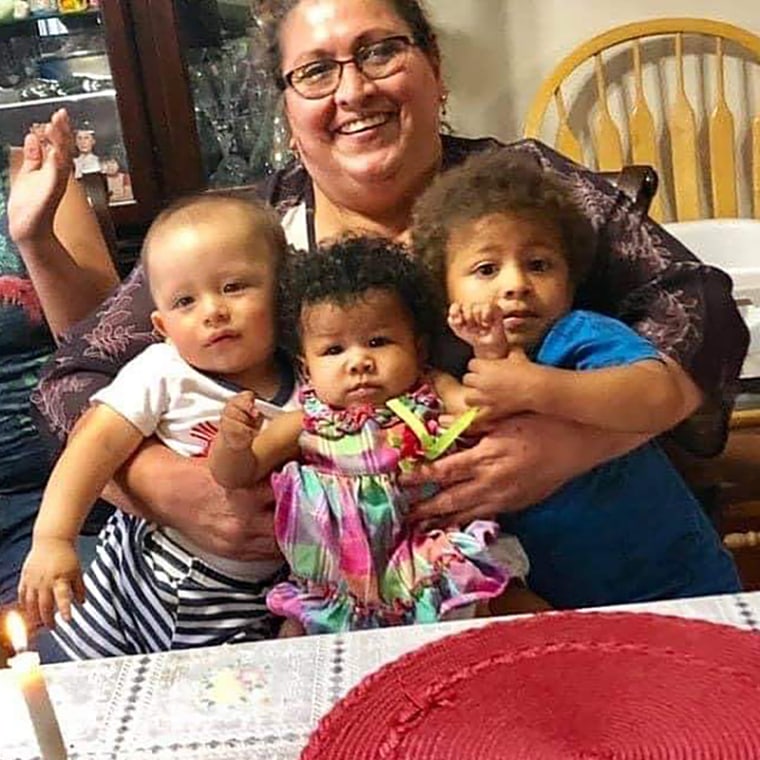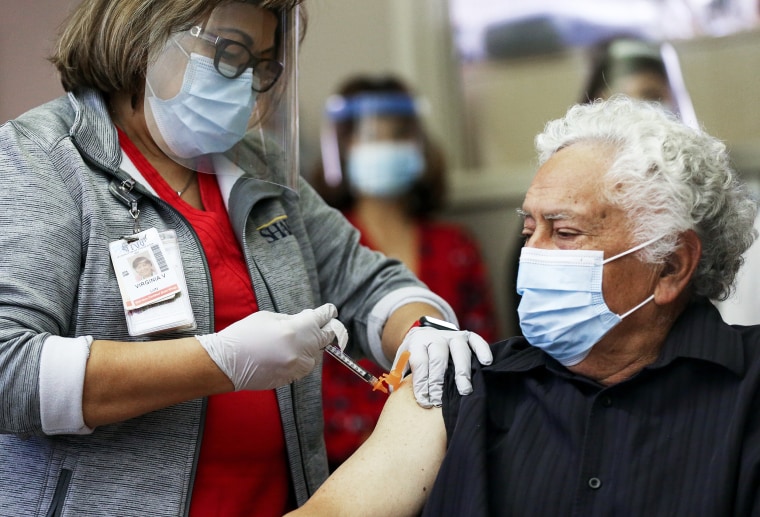LOS ANGELES — Yaneth Gutierrez, 34, an agricultural worker who picks produce in California's Central Valley, had to take two days off when she fell ill. Two weeks after she tested positive for Covid-19, the mother of two lost her job picking carrots because she did not show up to work.
“I don’t have the luxury of getting sick,” Gutierrez said. “I have not been vaccinated. I have to take extra care so I don't get sick again. I have heard bad rumors about the vaccine and I am scared, but the risk of bringing the virus home is bigger.”
California recently announced a shift in vaccine eligibility, from labor-sector-based to an age-based system that prioritizes Californians over 65. However, the state plans to continue vaccinating school personnel, emergency services and health care workers as well as food and agriculture workers as it transitions into the new age-based system, Gov. Gavin Newsom, a Democrat, said last week.
In an interview with NBC News, California Surgeon General Nadine Burke Harris said equity was at the forefront and that those who were already deemed eligible would have access to the vaccine, including farmworkers.
But trying to get vaccines for essential workers who qualify is proving to be difficult, according to some groups. United Farm Workers, the large labor organization, said it has not been able to get vaccine appointments for its workers through the state’s online portal.
Staff members said they have not been able to get past the first page of the portal. The pop-up message they get reads, “Based on your results you are not eligible for the current phase of the rollout but you will be eligible for a future phase.”
"I feel discriminated against," Gutierrez said. "I think they should give those of us in the fields priority. I think we all deserve the vaccine."
Teresa Romero, president of United Farm Workers, said many workers who are vulnerable are not being vaccinated.
"In the past two weeks, we have had three farmworkers under 65 pass away from Covid-19. The vaccine age limit is impacting the majority of people of color who are a part of the labor force," Romero said. "Conservatively, I can say that 90 percent of farmworkers in California are Latino."
Latino officials and labor advocates are echoing these concerns about the shift in tiers, saying these changes are putting Latino essential workers and their families at risk when counties throughout California are lifting restrictions.
Ron Herrera, president of the Los Angeles County Federation of Labor, AFL-CIO, blasted Newsom's decision, calling it "devastating."
“The governor's decision to shift from labor to age I think will prolong the infection rate because workers aren’t protected," Herrera said. "On day one, this federation preached that if we wanted to get control of the virus in Los Angeles, we had to control the workplace. If the workplace isn't contained, workers are taking the virus to their homes and communities. In the case of Latinos, these tend to be multigenerational homes.”
According to the U.S. Census, Latinos make up 39 percent of California’s population, but make up 55 percent of all confirmed Covid-19 cases and 46.5 percent of all deaths, according to state data.
The median age of a Latino in California is 28; only 7 percent of Latinos in the state are older than 64. The age required to make a vaccination appointment for non-health workers is 65.
In the state, Latinos make up half of front-line workers. But some front-line workers in service, production, transportation and material moving are not currently eligible for the vaccine.
“Latino families are overwhelmed by this pandemic, and the current safety net does not include all Californians,” said state Sen. María Elena Durazo, chair of the Latino Legislative Caucus, in a statement relating to health disparities and workplace inequities Latinos face amid the pandemic.

This week, Newsom announced the opening of two vaccination centers, one at the Oakland-Alameda County Coliseum in Oakland and another at the California State University campus in East Los Angeles, two areas that have been heavily impacted by the coronavirus.
Los Angeles native María Patiño, 30, said nearly every member of her immediate family was infected with Covid-19, including both of her parents. Her family consists of essential workers who reside in a multigenerational household. Last month, her mother, Rosa María Patiño, died of the coronavirus. She was 63 and a food-factory worker.
"She would arrive at work early to be sanitized, but there are three different shifts with a lot of workers working closely to inspect the food," Patiño said. "She wanted to be vaccinated. She was planning to retire in March."
Follow NBC Latino on Facebook, Twitter and Instagram.



